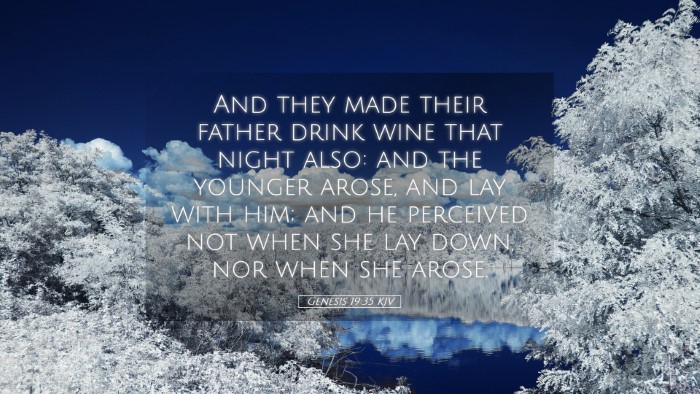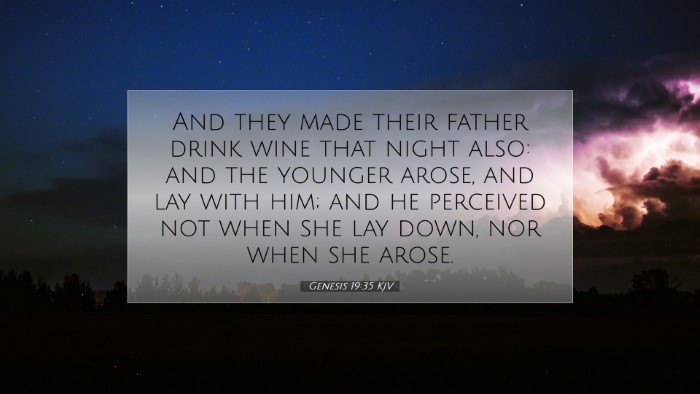Commentary on Genesis 19:35
Verse: "And they made their father drink wine that night: and the firstborn went in, and lay with her father; and he perceived not when she lay down, nor when she arose." (Genesis 19:35, KJV)
Introduction
Genesis 19:35 presents a troubling yet significant moment in the narratives of Genesis, following the destruction of Sodom and Gomorrah. This verse highlights themes of moral degradation, familial dysfunction, and the consequences of sin. The commentary draws from various public domain sources, particularly the insights of Matthew Henry, Albert Barnes, and Adam Clarke, to deepen the understanding of this critical passage.
Contextual Background
The events follow the deliverance of Lot and his daughters from Sodom. After fleeing to the cave, Lot is in a vulnerable position—physically, morally, and spiritually. The daughters, believing themselves to be the last of their race, illustrate a profound desperation and resort to a grave act of incest. The critical backdrop here is the moral collapse following Sodom’s destruction, which is essential for understanding the actions of Lot's daughters.
Insights from Commentaries
Matthew Henry
Human Frailty: Henry emphasizes the frailty of human nature. He notes that the daughters, rather than seeking a righteous path, succumbed to desperation, reflecting a tragic disjunction from faith in God's provision. This act stands as a warning about the consequences of living without divine guidance.
Intoxication: The intoxication of Lot is highlighted as a pivotal factor. Henry suggests that wine, a symbol of revelry and often debauchery, leads to moral blindness; Lot's failure to recognize his daughters exemplifies how sin can plunge an individual into dysfunction, disrupting the very fabric of family.
Albert Barnes
Desperation and Deception: Barnes elaborates on the desperation that drove the daughters to manipulate their father. He points out that their actions, perceived as surviving in a patriarchal society, demonstrate a serious moral failure that is compounded by ignorance. Barnes notes that this reflects a broader theme of sin's progression from intention to action, whereby the daughters believed they were correcting a situation but were ultimately perpetuating evil.
Consequences of Actions: He further comments on the significance of the resulting offspring, the Moabites and Ammonites, observing that the legacy of this act reverberates through Israel’s history. The consequences of this incestuously conceived lineage illustrate the long-term effects of sin, providing a lesson on familial responsibilities.
Adam Clarke
Understanding the Daughters' Mindset: Clarke places emphasis on the psychological condition of Lot’s daughters. He argues that their lack of faith in God’s protection led them to resort to drastic measures, indicative of the human tendency to circumvent divine solutions. Clarke stresses the spiritual blindness that results when individuals abandon faith and succumb to fear.
Lot's State: Regarding Lot, Clarke discusses the implications of his drunkenness. He delineates how alcohol affects moral judgment and emphasizes the tragedy not only in the daughters' actions but also in Lot's tragic fall, leading to the fulfillment of sinful desires and further humanitarian decay.
Theological Themes
- Moral Degradation: This incident underscores the depths to which humanity can fall when separated from God. The daughters acted out of desperation rather than seeking divine guidance.
- Consequences of Sin: The passage illustrates the far-reaching repercussions of sin—how one ill-advised action can result in generations of sinful conduct.
- Human Responsibility: Each character in this narrative assumes a form of blame. Lot’s passivity and his daughters’ actions exemplify the importance of understanding one’s spiritual duties and staying vigilant against moral decay.
Conclusion
The commentary on Genesis 19:35 serves as a stark reminder of the complexities of human nature and the dangers of disconnect from God's will. The integrative perspectives of Matthew Henry, Albert Barnes, and Adam Clarke contribute a multifaceted understanding, revealing layers of meaning that should challenge pastors, students, and scholars alike to reflect on their lives and the generational impacts of their actions. This passage exemplifies a critical juncture — a moment that teaches vigilance against despair and urges a return to faith amidst moral turmoil.


